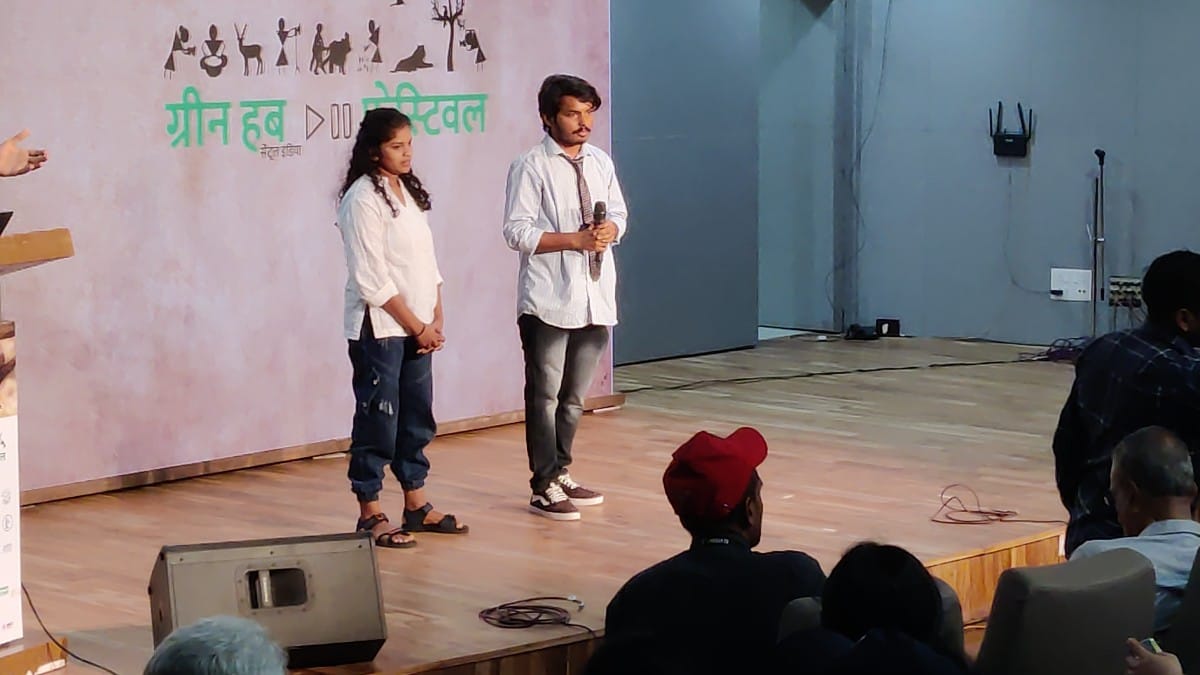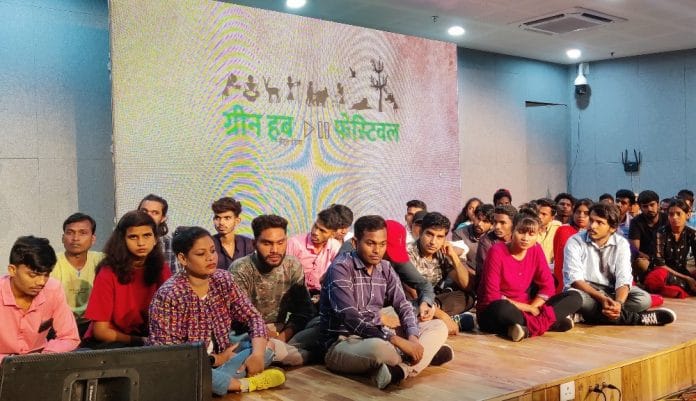Bhopal: The elephants had arrived in his Ranchi village after more than a decade. Sahebram Bediya, a 23-year-old man from Jharkhand, picked up the camera and started documenting the havoc they were causing. He was the first to capture live the destruction and the human-animal conflict. A high-school dropout and the eldest son of a disabled father, Bediya was now a pro at filmmaking.
And he is at a film festival in Bhopal being feted by cultural and filmmaking czars like Krishnendu Bose, Rita Banerjee and Doel Trivedy. Bediya’s film Gaj Dhundh Rahe Galiyara was screened at the festival.
“I didn’t even know how to hold a camera, I knew nothing about filmmaking or photography, but I learnt everything during the process. Now I want to continue making more such films on human-nature conflict and do something for my family and community,” he says.
Bediya isn’t alone. Seventeen rural youth belonging to tribal communities from across the country showcased their films at the first Green Hub Central India Festival in Bhopal. From social change, natural habitat, to women farmers and erosion of folk traditions, nothing sems to have escaped their lens.
Sooraj Meena, a 21-year-old woman from Rajasthan’s Udaipur who also showcased her film at the festival, did not tell her family about what she was doing for the past one year. “I could never make them understand about the camera. If they knew I am learning filmmaking and working with cameras, they would have not let me step out of the house again, so I never told them,” she says. But despite these challenges, she decided to document the lives of young women in her village who have been victims of domestic abuse and forced marriages.

Also read: Not a rubber stamp—In Droupadi Murmu’s backyard, the hunger for development has just shot up
Breaking barriers
There are many such back stories — of tribal and rural youth who showcased their work at the festival in Bhopal this weekend. The group of 17, including four women, has just completed a 10-month intense course — the first edition of the Green Hub Fellowship programme — that trained them in multiple aspects of filmmaking. The programme aimed to empower and engage them with the issues concerning their communities. The event was organised by civil society groups working in the area of conservation like Dusty Foot Foundation, and Mahashakti Seva Kendra, in association with Bharat Rural Livelihood Foundation, a Ministry of Rural Development initiative to upscale civil society action.
The two-day event in Bhopal was the tribal youth’s first exposure to the world of film festivals. And for many, even the simple act of speaking on a stage and answering questions from audiences about their films. The audience included prominent names from Madhya Pradesh’s civil society, non-government organisations, filmmakers, academicians, journalists and students like them. In auditorium full of people, they were asked questions on the challenges they faced while making films. Arti Singh, a fellow and tribal girl from Chhattisgarh, told the audiences how she was stopped from filming by upper-caste communities in a village in Rajasthan’s Ajmer. Singh was trying to document the story of a woman farmer- Saguni Devi.
Saguni Devi was also in Bhopal, stepping out of her home state for the first time to see her story on a big screen. She then went on stage and sang a song she wrote on the plight of a young Rajasthani girl who is not allowed to go to school as opposed to her brother. The auditorium resounded with stormy applause.
The air at Bhopal’s Ravindra Bhawan was inspiring, filled with so many stories of courage, conviction and passion for community work.
Also read: Why Dhankhar and Murmu are perfect fit in Modi’s Mission 2024
Conservation, documentation and filmmaking
The 17 fellows come from four states of Rajasthan, Chhattisgarh, Madhya Pradesh and Jharkhand and are aged between 18 and 35, representing tribal communities of Gond, Baiga, Mahaar, Meena, Kamar among others.
For them, the process of learning filmmaking and documenting human-animal conflicts, deforestation, water crisis, gender issues and tribal ceremonies among others has helped them understand their own and other tribal communities better.
“When I went to Jharkhand’s East Singhbhum to make a film for this project, I learnt about many songs that the community sings while trying to save the jungles. I did not know it earlier. It has inspired me to work for cultural documentation,” says Rohit Sarware from Madhya Pradesh’s Harda district, one of the fellows at the Bhopal festival.
Another fellow, Madhya Pradesh’s Vijay Ram Teke, who opened the festival with a Chhattisgarhi song – an ode to ‘Dharti Maiyya’ (mother earth) – says it is important to digitise and document such songs and cultural practices.
“A mix of tradition and modern can save such songs. Every song, sound of tribal instruments, should be digitised and archived,” he says. However, the current tribal generations, especially those who have moved out of their ancestral villages, rarely know the songs of their ancestors. Mahima Marwai, a Gond tribal girl from MP’s Mandala district, says she was never inspired to learn these songs and customs, but after spending close to a year documenting tribal traditions and issues, she will now go back and request her elders to teach her some songs.
Shashi Kumar and Sanjeev Marskole, from Jharkhand and Madhya Pradesh respectively, are inspired to take up work involving nature conservation and agriculture.
“The idea was that the communities need to be involved in making films that concern them – about their lives, cultures, livelihood and environment,” says Pramathesh Ambasta, CEO of Bharat Rural Livelihoods Foundation.
“When we talk about tribal societies, tribal communities and geographies – we find that people who are talking about them are not necessarily tribal themselves. This could be a way in which adivasi youth could be supported and encouraged to make films that concern them. We must remember that a lot of this knowledge which exists in tribal societies is under threat now. Even tribal youth may not be as inclined to look at them with a sense of pride or ownership. This entire programme and the platform for making films was to create a sense of ownership among these young adivasis,” he tells ThePrint.
Rita Banerjee, an award-winning conservation filmmaker and co-founder of Green Hub India, says that video is a transformative tool for social change. “I am a filmmaker myself, and I have observed that the process of video-making is a big way to learn about conservation and social change. It is a very experiential kind of learning”.
Prof G N Devy, president of BRLF and chief guest at the event, appreciated the films made by the fellows and emphasised on representation of the community by Adivasis themselves. The world needs to hear the stories of Adivasis from their own perspective, he said.
The fellows were also awarded a certificate for completion and 23 new fellows have also been inducted for the second batch of the project.
Green Hub India works on the idea of engaging and empowering youth from rural areas and tribal communities through the visual medium, and in turn creating a digital resource bank for wildlife, environment and indeigenous knowledge. The Green Hub Fellowship involves learning technical aspects of filming, editing, and storytelling; bringing to life untold stories of the land, people and generational knowledge. The fellowship was first started in the northeast and has engaged youth across the region, with an aim of documenting and conserving wildlife, biodiversity and sustainable traditional practices.
The fellowship moved to Central India, which is home to 76 million tribal people. The first edition of the programme invited applications from four states of Central India region with significant tribal population – Chhattisgarh, Madhya Pradesh, Rajasthan and Jharkhand. During the 10-month programme, the participants were trained in video documentation and film making by eminent resource persons from across the country. They were then coupled with a key social organisation in the region for an internship, with the help of which they documented one of the key issues concerning the communities.
“We were in the northeast for six years, and 90 per cent of the fellows are currently working with conservation or social change – either using the camera or working with the communities. And it has given us a grounding to take the fellowship to other places. Central India is different from northeast geographically and culturally, but the potential is the same”, Banerji says.
Also read: Rajya Sabha was India’s ‘elite space’. Modi has breached it with Dalit artist Ilaiyaraaja
Sense of ownership, pride
Many of the fellows that joined the programme were associated with civil society organisations working in their respective areas. While all of them did not have connections, they do see this as an opportunity to create a chain of change by bringing those forward who have been left behind.
Annu Bagmare, a 26-year-old Gond girl who made films documenting the work of an NGO working in the field of children education, says she came to know about the fellowship through the NGO she works with. However, she feels that now she and others like her, who got an opportunity, have the responsibility of bringing those forward who are still left behind.
“Whether there is any NGO or not, there will be a clan of those empowered, who will take their communities ahead”. She also raised awareness and helped girls from her community to apply for the next batch of the fellowship.
These young tribals want to move forward, but at the same time, also feel a sense of belonging to their roots. Devesh Singh, Sanjeev Marshkol and Shashi Kumar – three fellows belonging from different communities – understand the importance of moving forward with the world, but also realise how crucial it is for Adivasi communities to not forget their own culture.
“If one wants to progress, it is essential to come out of one’s own village. Education is very crucial, but I feel there should be a way to balance both development and conservation,” Devesh says.
Mahima Marwai, however, has a complaint. She went to see the Tribal Museum in Bhopal, and says there was not enough representation. “It’s fine to make a museum about Tribal communities, but I feel there should have been more things on display. It does not cover the entire tribal community. Also, if one really has to experience the tribal culture, they should visit the villages instead of museums. Our culture is not represented enough in museums,” she says.
(Edited by Anurag Chaubey)






